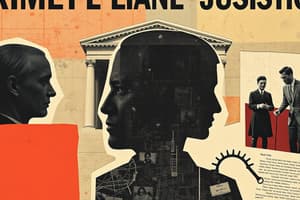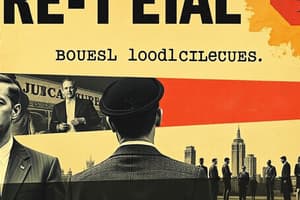Podcast
Questions and Answers
Which activity is typically part of the 'booking' process in the criminal justice system?
Which activity is typically part of the 'booking' process in the criminal justice system?
- Formal recording of the arrest, including the suspect's name, the crime, and possibly fingerprints and photographs. (correct)
- Negotiating the terms of a plea agreement with the prosecuting attorney.
- Determining bail eligibility based on the severity of the crime.
- Presenting evidence to the judge for initial review and case assignment.
During the initial appearance, what is a key determination made by the judge?
During the initial appearance, what is a key determination made by the judge?
- Whether there is probable cause to believe a crime was committed. (correct)
- The exact sentencing guidelines that will apply if the defendant is convicted.
- The admissibility of evidence that the prosecution intends to use at trial.
- Whether the defendant is guilty beyond a reasonable doubt.
What fundamental right was reinforced for defendants charged with a felony by the Gideon v. Wainwright decision?
What fundamental right was reinforced for defendants charged with a felony by the Gideon v. Wainwright decision?
- The right to represent themselves in court.
- The right to confront witnesses against them.
- The right to a speedy trial.
- The right to an attorney, even if they cannot afford one. (correct)
Which event typically occurs during an arraignment?
Which event typically occurs during an arraignment?
When an individual cannot afford bail, what action might they take to secure their release?
When an individual cannot afford bail, what action might they take to secure their release?
What does 'personal recognizance' entail in the context of pretrial release?
What does 'personal recognizance' entail in the context of pretrial release?
Proponents of pretrial release often argue that it:
Proponents of pretrial release often argue that it:
What is the primary objective of a preliminary hearing?
What is the primary objective of a preliminary hearing?
During a preliminary hearing, what must a prosecutor demonstrate to proceed with the case?
During a preliminary hearing, what must a prosecutor demonstrate to proceed with the case?
How many individuals typically serve on a grand jury?
How many individuals typically serve on a grand jury?
What is the central role of a grand jury?
What is the central role of a grand jury?
What is an indictment?
What is an indictment?
What is the legal significance of 'nolo contendere'?
What is the legal significance of 'nolo contendere'?
Approximately what percentage of criminal cases are resolved without going to trial?
Approximately what percentage of criminal cases are resolved without going to trial?
What does 'plea bargaining' typically involve?
What does 'plea bargaining' typically involve?
Which amendment to the U.S. Constitution guarantees the right to a jury trial in criminal cases?
Which amendment to the U.S. Constitution guarantees the right to a jury trial in criminal cases?
How many jurors are typically empaneled in a federal court trial?
How many jurors are typically empaneled in a federal court trial?
What does 'voir dire' refer to in legal proceedings?
What does 'voir dire' refer to in legal proceedings?
What is the concept of jury nullification?
What is the concept of jury nullification?
What is the purpose of a subpoena?
What is the purpose of a subpoena?
Flashcards
What is booking?
What is booking?
The process of recording an arrestee's identity and the alleged offense.
What happens at initial appearance?
What happens at initial appearance?
The judge informs the defendant of the charges, ensures they have an attorney, and sets bail or pretrial release conditions.
Gideon v. Wainwright impact?
Gideon v. Wainwright impact?
The Supreme Court decision Gideon v. Wainwright guarantees the right to legal counsel for indigent defendants in felony cases.
What is an arraignment?
What is an arraignment?
Signup and view all the flashcards
How to pay bail if short?
How to pay bail if short?
Signup and view all the flashcards
What is personal recognizance?
What is personal recognizance?
Signup and view all the flashcards
Why do supporters like pretrial release?
Why do supporters like pretrial release?
Signup and view all the flashcards
Preliminary hearing purpose?
Preliminary hearing purpose?
Signup and view all the flashcards
Prosecutor's burden at a preliminary hearing?
Prosecutor's burden at a preliminary hearing?
Signup and view all the flashcards
Grand jury size?
Grand jury size?
Signup and view all the flashcards
Purpose of a grand jury?
Purpose of a grand jury?
Signup and view all the flashcards
What is an indictment?
What is an indictment?
Signup and view all the flashcards
What is 'nolo contendere'?
What is 'nolo contendere'?
Signup and view all the flashcards
Cases not going to trial?
Cases not going to trial?
Signup and view all the flashcards
What is plea bargaining?
What is plea bargaining?
Signup and view all the flashcards
Amendment for jury trial?
Amendment for jury trial?
Signup and view all the flashcards
Federal trial jury size?
Federal trial jury size?
Signup and view all the flashcards
What is 'voir dire'?
What is 'voir dire'?
Signup and view all the flashcards
What is jury nullification?
What is jury nullification?
Signup and view all the flashcards
What is a subpoena?
What is a subpoena?
Signup and view all the flashcards
Study Notes
-
Booking in the criminal justice process refers to the formal recording of an arrest.
-
At the initial appearance, a judge informs the accused of the charges, advises them of their rights, and may set bail.
-
The Gideon v. Wainwright decision provided that those charged with a felony have the right to an attorney, even if they cannot afford one.
-
An arraignment is a formal reading of criminal charges in the presence of the defendant, during which the defendant is asked to enter a plea.
-
A person can obtain money if they do not have enough to cover bail via a bail bondsman, who posts bail for a fee, or through borrowing from friends and family.
-
Personal recognizance is the release of an accused person without bail, based on their promise to appear in court.
-
Supporters say that pretrial release allows defendants to maintain employment and family ties.
-
The purpose of a preliminary hearing is to determine if there is enough evidence to require a trial.
-
At a preliminary hearing, a prosecutor must establish probable cause that a crime was committed and that the defendant committed it.
-
16-23 people serve on a grand jury.
-
The purpose of a grand jury is to determine whether there is probable cause to believe that a crime has been committed and whether an indictment should be issued.
-
An indictment is a formal accusation by a grand jury that there is enough evidence to bring criminal charges against a defendant.
-
Nolo contendere is a plea by which a defendant accepts conviction as though a guilty plea had been entered but does not admit guilt.
-
Approximately 90-95% of criminal cases do not go to trial.
-
Plea bargaining is the process where the defendant pleads guilty to a lesser charge in exchange for a more lenient sentence.
-
The Sixth Amendment guarantees the right to a jury trial in most criminal cases.
-
12 jurors serve in a federal court trial.
-
Voir dire refers to the process of questioning potential jurors to identify biases or prejudices.
-
Jury nullification occurs when a jury returns a verdict of "not guilty" despite believing that the defendant did commit the crime, because they disagree with the law or its application in the case.
-
A subpoena is a legal order requiring a person to appear in court to give testimony.
-
The job of the public defender's office is to provide legal representation to defendants who cannot afford an attorney.
-
Double jeopardy means a person cannot be tried twice for the same crime if they have already been acquitted.
-
A defendant can appeal based on errors of law or insufficient evidence.
-
The final stage in the criminal justice process is corrections, which can include imprisonment, probation, or parole.
-
Eight sentencing options judges have:
- Suspended sentence
- Probation
- Fines
- Restitution
- Work release
- Imprisonment
- Death penalty
- Home confinement
-
Four reasons for punishing convicted defendants:
- Retribution
- Deterrence
- Rehabilitation
- Incapacitation
-
Parole is the conditional release of a prisoner before the end of their sentence.
-
Jails are typically run by local law enforcement and hold people awaiting trial or serving short sentences, while prisons are run by state or federal governments and hold people serving longer sentences.
-
The US prison population increased in the 1990s and early 2000s due to stricter drug laws and increased enforcement, longer sentences, and rising crime rates.
-
Over 600,000 adult offenders leave prison each year.
-
Approximately 68% of released prisoners are arrested for a new crime within three years.
Studying That Suits You
Use AI to generate personalized quizzes and flashcards to suit your learning preferences.




